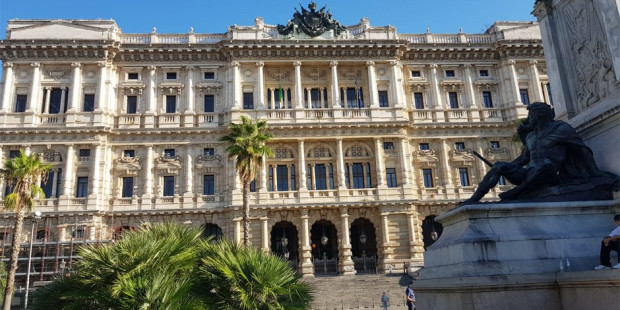Italy – the European Commission is now taking a closer look
The Italian judicial reform is not quite as simple as Giorgia Meloni and her Justice Minister Carlo Nordio had imagined. The European Commission is asking unpleasant questions.
 The Court of Cassation in Rome - and minister of justice Carlo Nordio has unpleasant questions to answer... Foto: Eurojournalist(e) / CC-BY 2.0
The Court of Cassation in Rome - and minister of justice Carlo Nordio has unpleasant questions to answer... Foto: Eurojournalist(e) / CC-BY 2.0
(KL) – Ever since Giorgia Meloni has come to power in Italy, her Justice Minister Carlo Nordio has been working on a judicial reform that is supposedly and commendably intended to shorten the sometimes endless duration of court proceedings. At first glance, this sounds nice and like progress, but on closer inspection you realise that this “reform” only serves to make criminal acts committed by the “top 10,000” unpunishable. At the same time, the criminal offence of abuse of office is to be abolished, as is the tapping of telephones, through which many a high-ranking personality has made agreements with colleagues. But now, this is even going too far for the European Commission. Justice Commissioner Didier Reynders is now beginning to ask questions in Italy that are anything but easy for his counterparts to answer.
But Italy has to answer, because the country is still waiting for 200 billion euros from the pandemic pot and Rome will only receive this money once the questions from Brussels have been answered satisfactorily. And that is likely to be difficult. Italy is in the process of introducing a two-tier justice system: Impunity for “white collar offenders” and penalties for petty crooks. The small ones are hanged, the big ones are let off. Will Brussels accept this?
While in Italy there is a rare unanimity between the government and the opposition on this “reform”, which is probably due to the fact that politicians from all political groups cope with scandals, lawyers, judges, public prosecutors and constitutional law experts are standing on their hind legs to protest against this “reform”, which is practically a blank cheque for corrupt politicians, judges and company bosses. Will the Italian government now be able to lead the European Commission around by the nose?
Yet it is precisely these corrupt politicians, judges and company bosses who are weighing heavily on Italy. Documented offences against the “Anti-Mafia Law” (Legge 55/1990) are simply ignored or the corresponding complaints are passed on from one court to the next until they reach the point where a compliant judge closes the proceedings. Making this procedure legally secure is not a “judicial reform”, but a “judicial scandal”.
Of course, as in recent decades, organised crime and the Masonic lodges are also involved in this situation. Numerous high-ranking members of “il sistema” frequent the lodge “Ungheria” or “P5”, although it must be understood that this lodge has nothing to do with actual Freemasonry, but is merely a contact centre for high-ranking personalities to pursue their dark business in peace.
We must now hope that Didier Reynders does not allow himself to be taken in by these people, but instead works consistently and in the interests of Europe to put a stop to these criminals in suits and ties. The whole of Italy would benefit if “il sistema” was weakened to such an extent that the Italian people take charge of their country again…

Kommentar hinterlassen